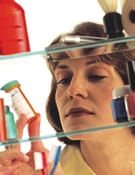Content on this page was developed during the 2009-2010 H1N1 pandemic and has not been updated.
- The H1N1 virus that caused that pandemic is now a regular human flu virus and continues to circulate seasonally worldwide.
- The English language content on this website is being archived for historic and reference purposes only.
- For current, updated information on seasonal flu, including information about H1N1, see the CDC Seasonal Flu website.
Caring for Someone Sick at Home
Medicine Safety and Children
December 5, 2009, 6:00 AM ET
About medicines for children
 Store all medicines out of reach of children. Place them in a locked cabinet where children can’t reach them.
Store all medicines out of reach of children. Place them in a locked cabinet where children can’t reach them. - Buy pain and fever medicines that say “children’s” on the label. Also, look for the words “acetaminophen” or “ibuprofen” on the label.
- Call the doctor if your child is very small or very large for his or her age so you will be sure to give the right amount of medicine. The dose you give your child depends on the child’s age and weight.
- Use a special medicine spoon, dropper, or the cap that came with the medicine. Wash the cap, dropper, or spoon with soap and water after each use.
- Don’t give cough or cold medicines to children younger than 4 years of age.
Warning
Think your child age 18 or younger might have the flu?
Never give them aspirin or products with aspirin in them.
Check all medicine labels to make sure they do not contain aspirin, also called salicylate. Although it mostly affects people age 18 or younger, Reye’s Syndrome can strike anyone who takes aspirin products when they have the flu.
Reye’s Syndrome is a rare, serious illness than can affect the blood, liver, and brain of someone who has recently had a flu virus. This illness can cause confusion, seizures, or coma. Talk to your child’s doctor about signs and symptoms of Reye’s Syndrome.
Get email updates
To receive weekly email updates about this site, enter your email address:
Contact Us:
- Centers for Disease Control and Prevention
1600 Clifton Rd
Atlanta, GA 30333 - 800-CDC-INFO
(800-232-4636)
TTY: (888) 232-6348 - Contact CDC-INFO
 Download & print this entire guide
Download & print this entire guide

